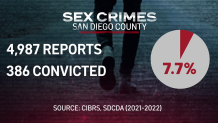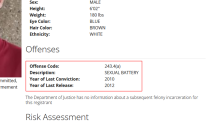WARNING: This story may have disturbing details. Discretion is advised.
Critics argue our criminal justice system fails survivors of sex crimes. Many say changes need to happen to bring justice to victims of some of the most heinous crimes committed in San Diego County and across the country.
But police and prosecutors say these cases are often the most difficult due to a lack of evidence, and in many cases, what they call a lack of cooperation on behalf of the victims themselves.
To analyze what happens after people report sex crimes to police, NBC 7 Investigates compared CIBRS, a state crime database, with public records requests from the San Diego County District Attorney’s Office and the San Diego City Attorney’s Office.

Law enforcement agencies in San Diego County fielded 4,987 complaints for crimes of sexual violence during a two-year period, from 2021 through 2022. We included sex crimes committed against the will of the victim in our analysis. That includes crimes like rape, sexual battery, lewd acts on children, sodomy and human trafficking.
Only 7.7% (386) of those nearly 5,000 police reports ended with punishment for a suspect.
While that’s a startlingly-low percentage, it’s much higher than seven other cities NBC investigated. In Los Angeles, just 1.4% of police reports for sex crimes resulted in any conviction. In Chicago, it’s 2%. And in Dallas, it’s 3.7%.

Christy Heiskala counts herself among those voices calling for change. Her family is forever changed by what happened more than 17 years ago inside a Carlsbad classroom.
Heiskala remembers how the school year started for her daughter entering the third grade. She was assigned one of the most popular teachers at Pacific Rim Elementary, Raymond Firth. Despite that, Heiskala told us she had misgivings.
“Something just felt off,” Heiskala said. “But he was the favorite teacher on campus. We felt so lucky that my daughter got him.”
Just a couple weeks into the new school year, Heiskala's daughter was molested by Firth. The description of what happened would be retold countless times to investigators and inside criminal and civil courtrooms. Heiskala says it’s important for people to know what happened to her then-8-year-old daughter.
“He came up behind her while she was writing in her planner and he started by rubbing her shoulders, but then he moved down and he groped her breasts, like repeatedly and my daughter claims very hard,” Heiskala told us. “Groped her breasts. And then he moved down and groped her vagina, and again she said it was very hard and painful. He grabbed her vagina.”

The trauma of that event, nearly two decades ago, still lingers for the family. Heiskala now works as a sex assault victim advocate for a local law firm.
A lack of evidence?
Heiskala still remembers the first thing a police officer told them when they reported the molestation.
“He literally looked at me and my 8-year-old daughter and said, ‘This doesn’t make any sense,” Heiskala said. “'Why would a teacher molest their student the second week of school?’’’
Ultimately, Heiskala says a deputy district attorney decided that without another accuser, her daughter’s case didn’t have enough evidence to move forward.
“It’s only a he-said-she-said because you didn’t do your job,” Heiskala told us. “Not because of the victim.”
Years later, Heiskala would learn that evidence existed when she successfully sued the Carlsbad Unified School District. Her attorneys unearthed more troubling reports about Firth. One parent said he tugged on her daughter’s underwear when she bent over. Teachers and a school principal also reported that he would sit students on his lap during class and have students play under his desk. A school official also said he was discovered alone with a female student in his classroom with the door closed.
After it lost the lawsuit, the Carlsbad Unified School District said it improved the way it investigates these types of claims and now employs a third-party investigator when accusations are made.
Heiskala's experience with law enforcement wouldn’t come as a surprise to Northwestern University law professor and former prosecutor Deborah Tuerkheimer. Tuerkheimer authored Credible – Why We Doubt Accusers and Protect Abusers and has spent years researching sex crime investigations, convictions and victims. She says police detectives and prosecutors need to do more to collect evidence, and that begins with how law enforcement interacts with accusers.
“I heard from so many victims that what happened in the aftermath was as bad as or even worse than the abuse itself,” Tuerkheimer said. “The officer just decides early on that this is a case that cannot be proven. This is a he-said-she-said case, it’s going nowhere. And so, it goes nowhere.”
Why cases are so difficult
Investigators like Sgt. Jessica Boegler say the very nature of these cases makes them especially challenging. At the time of our interview, she was assigned to the Child Abuse & Sexual Assault unit with the San Diego County Sheriff’s Department. That unit is comprised of 21 people: one captain, one lieutenant, three sergeants, four sex assault detectives and 12 child abuse detectives.
“It’s difficult when you know something happened,” Boegler said. “And you know who did it. And there’s just not enough to get that full conviction.”

Boegler says when someone calls the sheriff’s department to report a sex crime, a patrol officer handles the preliminary investigation. If the case meets the unit’s criteria – for example, statutory rape, violent sexual assaults, residential hot prowls or series, or a known suspect – the case gets assigned to a detective in the specialized unit. If not, a local area detective will investigate it.
“You don’t necessarily need a witness,” said Boegler. “We prosecute cases all the time without a witness.”
A victim, however, can make or break an investigation, Boegler told us.
“And that’s through the whole process,” Boegler told us. “It’s a very long draining process to retell your worst day over and over and over to people in different capacities. Whether that’s doctors, social workers, detectives, district attorneys. And a lot of times it's sometimes too much for them.”
Boegler says it can be too much for detectives too when survivors are on board, and her unit hands over cases to the district attorney, but prosecutors decide not to move forward.
“It’s not a good feeling,” Boegler said. “You want to get justice for these victims as best you can. And we work as much as we can to do that, and collaborate with everyone that we need to, and it doesn’t always go as well as you hoped.”
Investigations that aren’t prosecuted
Detectives turning over investigations to prosecutors is just one part of the process. Whether prosecutors will take offenders to court is a different question entirely.
“At every stage of this process, we’re seeing the cases drop out,” Tuerkheimer told us.
A victim’s testimony is evidence. But Tuerkheimer says prosecutors either treat it as less than themselves or anticipate a jury will. In her experience, prosecutors often only press charges against suspects they know a jury will convict — a standard she believes far surpasses what is legally required or morally right.
“Prosecutors should be taking more of these cases forward,” Tuerkheimer said.
San Diego County District Attorney Summer Stephan said it’s more complex than that and told us there’s a lot on the line.
“You have to be careful also because you are dealing with people’s lives and you don’t want to get it wrong,” Stephan said.

Stephan pointed out, for police to make an arrest, they just need to meet a probable cause standard. She says that means there’s a 51% or higher chance something happened. For prosecutors to take the next step, the standard is significantly higher.
“So the law is kind of rigged against us in rape cases,” Stephan said. “For us to charge it, we need to show proof beyond a reasonable doubt. We need to believe that 12 jurors will all agree that this was a rape that wasn’t consented to and that was a violation of criminal law. And that’s a very high standard.”
A standard that she says can sometimes feel impossible, when you consider a jury is a reflection of our society and even now, that society struggles to believe accusers.
“We still have a culture where people think it’s OK,” says Stephan. “And the guys laugh about it. And it happens a lot.”

The San Diego County District Attorney’s office says local law enforcement agencies handed over 1,614 sex crime cases in 2021 and 2022. Of those, prosecutors filed charges against 624, or 38%. Of the cases that were charged, the district attorney says 90% ended with a conviction.
But most of those convictions (86%) were plea agreements. That statistic is not unique to sex crimes. It’s also the same percentage of plea deals for all types of criminal prosecutions.
“There’s nothing wrong or inappropriate with an early disposition of guilt. It’s something we encourage,” said Stephan.
Stephan told us one of the biggest benefits of a plea deal is defendants waive their right to appeal.
“That is often very good for victims,” Stephan said.
And then, of course, there’s the obvious. Convictions guarantee punishment, something a jury doesn’t always deliver.
“We can never guarantee a conviction. Eleven guilty to one not guilty is a hung trial,” Stephan said. “So you’re not getting a conviction in that situation. So those are the risks.”
Lesser punishments with plea deals
But that doesn’t mean everyone is happy with the results of a plea deal. They come with a glaring downside. Initial charges often get dropped and replaced with less severe charges. This means the charges listed with anyone on the sex offender registry can often be significantly less serious than the charges reported to police or initially charged.
In California, defendants cannot plead down from an alleged sexual felony in most cases. However, prosecutors can find a workaround. For example, a prosecutor can drop sex crime charges against a suspect and then refile charges for a different crime, like kidnapping.
A similar situation played out in 2019 in a high-profile criminal case in San Diego County. More than 16 women accused former sheriff’s deputy Richard Fischer of sexually assaulting them while in uniform. He faced 20 criminal charges. But the day his trial was scheduled to begin, the prosecutor announced a plea agreement. Fischer pleaded guilty to seven new charges, far fewer and less severe than the 20 the DA had at one point filed against the former deputy. All charges of sexual assault were dropped.
In Heiskala's case, nine months after Firth molested her daughter, another student came forward. Then a third victim after that. With three accusers, the deputy district attorney reopened the case and filed criminal charges against Firth. But their case never made it to trial, because the prosecutor struck a plea deal.
“I was crying and yelling at her, because she kept saying, ‘I need you to be OK with this,’” Heiskala said.
Heiskala says the other child survivors and her daughter wanted to testify, but says the deputy district attorney told her over the phone that a trial was too risky.
“He physically violated my daughter, and the charge was going to be reduced to false imprisonment for making her stay in the classroom to sign her planner,” Heiskala said. “To this day I can’t live with that. That doesn’t feel like justice to me.”
At one point during the prosecution, Firth was charged with six counts of lewd acts on a child. Those charges carried a maximum penalty of 18 years in prison. Instead, those charges were dismissed, and he pleaded guilty to two counts of sexual battery by restraint and one count of false imprisonment by violence, menace, fraud or deceit. He was given a prison sentence of three years and eight months, ordered to pay fines and restitution, and registered as a sex offender.
But Firth was paroled after less than two years in prison. And his sex offender registry doesn’t mention the child molestation charges or indicate a child was a victim. It only states the sexual battery charge.

“Twenty-two months for molesting three 8-year-old girls is not justice,” Heiskala said. “It’s a slap in the face really. It feels like a slap in the face.”
Making matters worse, Heiskala says they also didn’t know Firth got paroled early. They only found out after she said her daughter ran into him at a supermarket parking lot.
"That was pretty traumatizing for her,” Heiskala said. “It really scared her. She didn’t feel safe. I didn’t feel safe.”
NBC 7 tried contacting Firth for our report, but he didn’t respond.
A stronger focus on investigations in San Diego
Firth’s prosecution occurred before Stephan was sworn into office as San Diego County District Attorney. She concedes law enforcement has work to do in how it handles sex crime investigations.
“I used to get these rape cases and there isn’t a single picture of the scene, because they’re not treated as a crime scene,” Stephan said.
In 2005, Stephan helped pioneer the DA’s Sex Crimes and Human Trafficking Division.
“That was my life’s dream to do that,” Stephan said. “I felt that sex crimes needed that special trauma-informed team that really understood the psychology of those cases, the psychology of victimization, the psychology of the offender to really put these cases together."
Today, she says her office works with police to seek and catalog more evidence. She says the county has cleared its rape test kit backlog. She says these efforts and results are reasons why San Diego’s conviction rates are higher than other cities NBC analyzed.
“The rubber meets the road with law enforcement and how those cases are investigated,” Stephan said. “The quality, the work that goes into them. And I believe San Diego has made great progress but it’s not going to stop.”
Moving forward is a life-long challenge for survivors
Heiskala's family’s experience changed her forever and led her to change careers to become a sex crime victim’s advocate for a civil law firm. She says it’s fulfilling to help survivors seek justice they were often denied by the criminal justice system.
“They deserve a trial when they want a trial,” Heiskala told us. “And they deserve more effort. More resources and more effort put into their case.”
Both the district attorney and investigators want victims to know it’s never too late to come forward. They both told us they’ve had a lot of success with victims who reported a crime but weren’t ready to move forward who then came back years later and got a successful conviction.
“I wish people knew it’s OK to not want to move forward with an investigation,” said Boegler. “You can still report. And we can still have successful prosecutions later when you are ready.”
What sex crime survivors should do after being assaulted
RAINN, the Rape, Abuse & Incest National Network, created a national sexual assault hotline which can connect survivors with resources. That number is (800) 656-4673.
If an assault just happened, it advises that you should:
- Get to a safe place and consider reaching out to someone you trust for support
- Know that what happened wasn’t your fault
- Call their hotline to be directed to local resources for medical care and learn about your options for reporting the crime
Help and information can also be found locally with San Diego’s Center for Community Solutions. Its crisis hotline is available 24-7 by calling (888) 385-4657.

